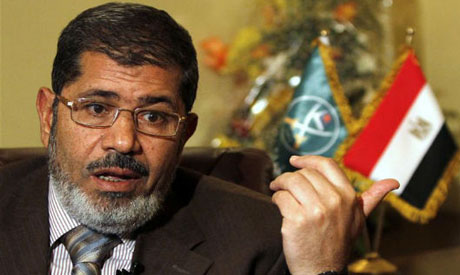 "As a businessman who engages in industrial activity, I belong in this place – even if the previous circumstances didn’t allow me to participate in it."
"As a businessman who engages in industrial activity, I belong in this place – even if the previous circumstances didn’t allow me to participate in it."
With these words, Khairat El-Shater, leading Muslim Brotherhood figure and disqualified presidential candidate, began his speech on Wednesday before members of the Egyptian Federation of Industries.
The invitation was originally addressed to Mohamed Mursi, the Brotherhood's approved presidential candidate, who arrived at the event a few hours late having been busy with a television interview.
El-Shater, who himself has substantial business interests, spoke longer then Mursi, who also asked him to answer some of the questions from the audience at the end of the session. The two men couched many of their responses in general terms, avoiding specifics.
"Energy policy, which is crucial for industry, along with agreements on customs and taxes and policies that affect the industrial sector were not conducted [under the former regime] according to global strategic policy," El-Shater said. "When we talk about our 'renaissance' programme, it's not something rigid but we listen to others' opinions."
In terms of taxation, Mursi said: "Talk about progressive taxation should be postponed. The one paying the taxes should have a say in the issue and taxpayers should also feel the benefits of the taxes they're paying."
The dominant impression was of two political figures very accommodating to the concerns of Egypt's business community -- something true for the Muslim Brotherhood as a whole, which advocates a brace of economically liberal measures.
"The private sector employs about 17 million people, triple the number in the public and governmental sector," said Mursi. "We have to give special care to industry sector. The state should provide lands to industry with built-in utilities."
He also raised a long-standing complaint of investors, that runaway Egyptian bureaucracy is stymying enterprise.
"Periodic renewing of permits is a burden as we know, but it is the role of the people working in the field to propose new solution and legislations," he said.
Responding to a question from the film production chamber of the federation, Mursi said that if Egypt wishes to create a real film industry it must set targets and allocate money from the budget to make this a reality.
He also suggested the state should take a larger role in guiding film content.
"The entertainment part is too big and the socially conscious side that tackles society’s problems is missing. The cinema played a role in the Cold War bigger than the nuclear weapon -- and it is much cheaper," said Mursi, advocating a bigger role for the Ministry of Culture.
The Brotherhood's would-be president went on to discuss more general matters.
"I am optimistic -- the future will be better," Mursi declared. "We want Egypt to be a stable country and for people to trust its president and government by making the people feel partner in the country having rights and duties. The era of the president as institution is over."
The Brotherhood's two-man team also took time to describe the group's showpiece 'renaissance' project, saying that its proposed reforms to political, security and judicial systems should be complemented by an economic vision.
"Investors from the Gulf countries see potential in Egypt's large market, but they need security and stability to invest ... without these things you cannot conduct economic activity," said El-Shater in his opening remarks.
The disqualified candidate then talked of education and its importance to the labour market before moving on to the topic of social justice.



